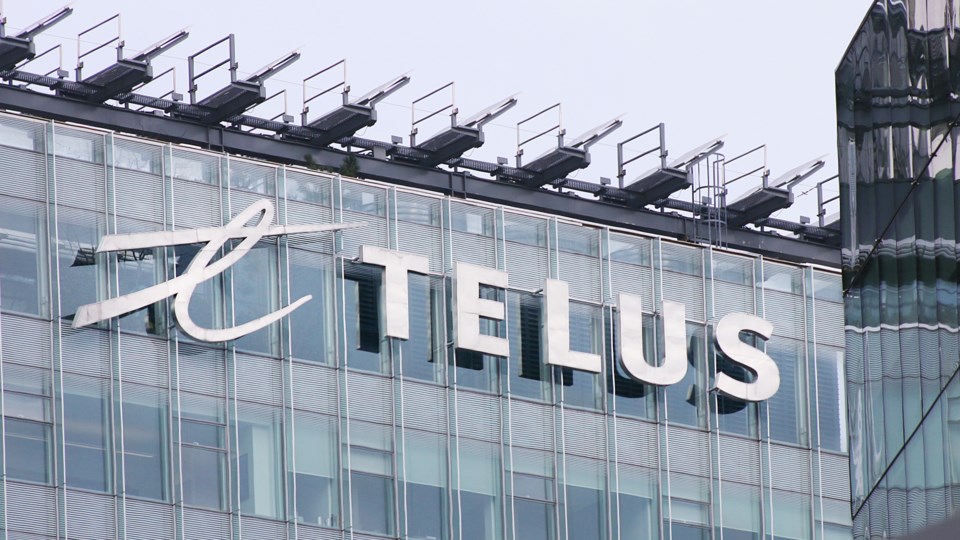Two major Canadian telecommunications companies made grand announcements this week about investing billions of dollars in British Columbia.
Vancouver-based Telus Corp. (TSX:T) said it plans to invest $15 billion in B.C. in the next five years. This would be part of $70 billion it plans to spend across Canada in that timeframe to expand and improve its network infrastructure and generally improve operations.
"This investment builds on an impressive track record, with Telus having invested more than $66 billion in B.C. since 2000," the company said today in a news release.
The money for B.C. is set for a wide range of purposes, and it comes as the province's artificial intelligence (AI) investment climate remains strong as the sector develops.
Some of the Telus money will go to improve its 5G and LTE services at 228 sites across the province, it said. The spending is intended to significantly improve wireless coverage and give the company the ability to adjust to future demands, according to Telus.
Telus also plans to redevelop office buildings and launch what it calls a "sovereign AI factory" in Kamloops powered by Nvidia Corp. (Nasdaq:NVDA). That AI factory would "help Canada develop domestic AI technologies, increase productivity, protect data and support businesses, making the country economically competitive and future-ready," Telus said.
Industry insiders have told BIV that data centres and supercomputing facilities in Canada are important for sovereignty reasons as well as for research and business needs.
In an era when U.S. President Donald Trump has taunted Canada as a 51st state and has threatened to use “economic force” to achieve that goal, there is a dawning realization for many Canadians that unexpected and harmful protectionist measures from Canada’s longstanding trade partner are likely.
Were Trump to suddenly levy large fees on any foreign individual or company using services from U.S. technology companies—as unlikely as that might seem—Canadian companies using compute resources from Amazon.com Inc. (Nasdaq:AMZN), Alphabet Inc. (Nasdaq:GOOGL) and Microsoft Corp. (Nasdaq:MSFT) would be left at a disadvantage.
Nvidia is based in the U.S. but is the dominant player in providing graphics processing unit chips for AI use.
Nonetheless, Telus touted its facility for being within Canada's borders.
"One of two sites in Canada, this secure facility provides Canadian businesses and researchers access to cutting-edge technology, ensuring every piece of data, computation and breakthrough created will remain within our borders," Telus said in a press release.
Telus plans to invest capital to connect more B.C. homes to its PureFibre network, enable wireless connections on the Highway 20 corridor for what it said is the first time and support the community through work on boards and organizations such as the Vancouver Whitecaps, among other initiatives.
Not to be outdone, Montreal-based Bell Canada yesterday announced it will open six AI data centres in B.C. as part of its plan to create the largest AI-compute project in Canada. It did not pinpoint the cost of this investment although it is likely in the billions of dollars.
The first of the Bell data centres would be a seven-megawatt facility set to open in June in Kamloops, in partnership with American AI inference provider Groq, which is not to be confused with Grok, which is billionaire Elon Musk's AI chatbot. Bell then plans to open a data centre in Merritt by the end of the year.
Bell has touted a plan to be more technology-focused, and said the data centres will provide about 500 megawatts of hydroelectric-powered AI-compute capacity.
AI compute is what powers AI systems to execute tasks, such as processing data or training machine-learning models.
Bell calls its project, Bell AI Fabric, and its plan is to have it help support Canadian businesses and governments’ AI needs. This would be by providing strategy, software and infrastructure, the company said.
Rogers Communications Inc. is another large Canadian telecom, but unlike the others, it said last year that it was listing its data centres for sale in a bid to raise $1 billion to pay off debt incurred when it merged with Shaw.
The large announcements on AI data centres in B.C. come as the province is hosting the Web Summit, which has been dubbed the "Olympics" of the tech world.
Groq's chief marketing officer, Chelsea Susan Kantor, spoke yesterday at the Web Summit but did not mention the big announcement of her company's involvement with Bell. Kantor was on a panel that was focused on how to sell products to Gen Z.



